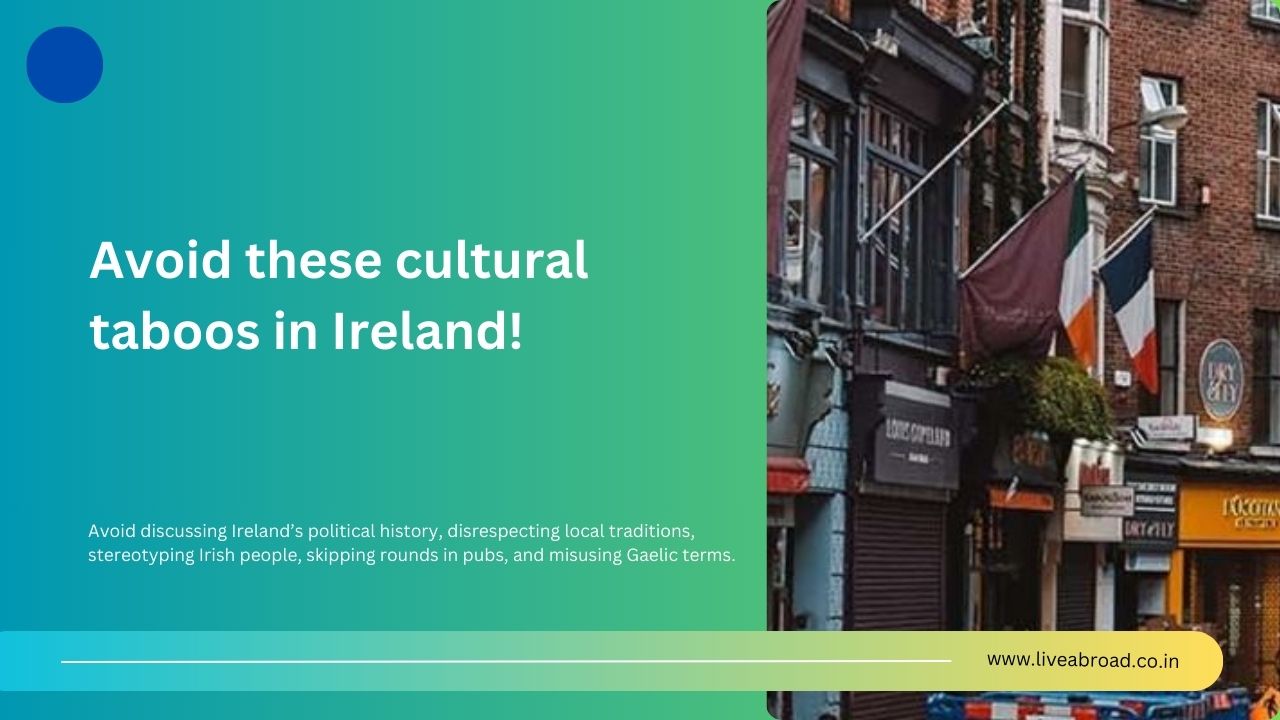When studying in Ireland, be socially mindful of these taboos
Ireland, also known as the Emerald Isle, is renowned for its verdant and endearing landscapes. It is a country that is culturally wealthy in addition to its beauty. Ireland, a country that has produced exceptional literary academics such as Oscar Wilde, James Joyce, and Samuel Beckett, is a destination that many students elect to study abroad.
Cultural mindfulness in Ireland
When contemplating a study abroad in Ireland, it is imperative to comprehend the cultural distinctions and the necessity of exhibiting greater respect and courtesy toward them. While studying and residing in Ireland, it is imperative to address the following:
Ireland is not in Britain
Always bear in mind that Ireland is not a constituent of the United Kingdom. Referring to individuals from Ireland as British or from the United Kingdom can be considered offensive to them. Additionally, it may be offensive to refer to numerous individuals in North Ireland as “Irish.”
Hogging a conversation can be understood as rude
In a novel environment, where there are a variety of conversations to engage in, the majority of us enjoy conversing. However, it is always advisable to refrain from dominating the conversation. In Ireland, this type of conversation is frequently perceived as aggressive or impolite. Be cautious of this behavior, improve your listening skills, and demonstrate genuine interest in the opinions of others.
Additionally, as an additional recommendation, it is advisable to refrain from discussing money with Irish individuals, as they perceive it as offensive and uncomfortable. It is inappropriate to inquire about their income or financial status in general.
Not all Irish people love to drink
You may unintentionally bring up the stereotype that Irish individuals are adept at managing their alcohol consumption during your conversation. However, it is not always appropriate to discuss this in a group setting, as not all Irish individuals are fond of alcohol. For a more positive relationship with your peers, consider approaching the situation from a subjective perspective.
Be careful of tub etiquette
In a pub, the Irish imbibe in rounds, which means that only one individual orders a drink for each person in the round. Therefore, it is imperative that you order at least one round of beverages, as individuals may form an inaccurate opinion of you if you fail to adhere to the custom.
Be polite in your conversations
Politeness is universally valued, and the Irish have their own unique methods of demonstrating it. Therefore, we recommend that you incorporate phrases such as “thank you” and “please” into your daily interactions. Also, Irish individuals are known for their polite demeanor and their propensity to wait patiently in a queue. Therefore, it is important to protect this custom.
We trust that you are at ease with the act of shaking hands, as it is a customary practice in Ireland when individuals meet or depart. In rural areas, Irish drivers are also expected to demonstrate appropriate etiquette by acknowledging other drivers. They elevate a finger or hand from the steering wheel.
Always remove your hat while entering a home, church, or pub
Please ensure that you remove your hat before entering a residence, church, or pub, if you are wearing one. Nevertheless, it is preferable to refrain from wearing a hat altogether.
Avoid talking about controversial topics
Many individuals worldwide are sensitive to controversial topics, such as politics and religion, as you are aware. It is advisable to refrain from engaging in or initiating discussions regarding such subjects. The majority of Irish individuals hold strong opinions regarding their country’s history. It would be greatly appreciated if you were to refrain from participating in these contentious discussions. Use your language with caution.
The scenic beauty and rich culture of Ireland have captivated a significant number of international students from around the globe. Nevertheless, our international education experts are available to help you with the admission process if you are interested in studying in Ireland. Furthermore, they will assist you in selecting a university and a course of study in Ireland.
